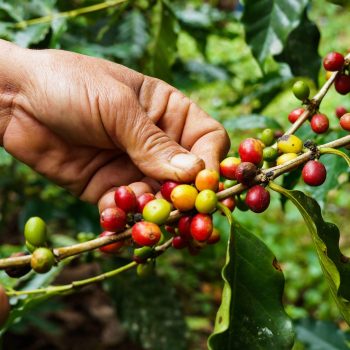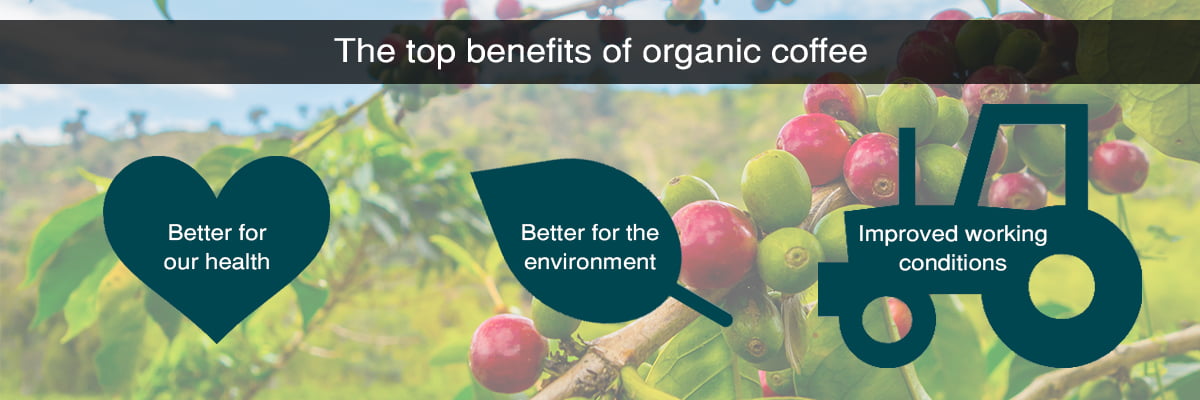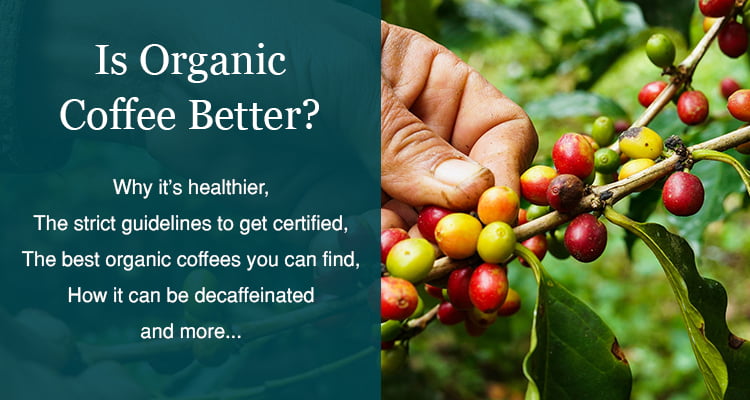
Use this easy guide to find the best organic coffee on the market, what it actually means, how coffee beans get their certification and other fascinating topics about this type of sustainable farming.
There is a lot of discussion about organic coffee farming as to whether it is better than the usual processing. In this post find the facts as to how it affects your health, the environment, farms and workers.
Organic coffee beans certainly don’t mean any less flavour, so keep reading to find out more on…
- What does organic coffee mean?
- How is organic coffee decaffeinated?
- Is organic coffee better for you?
- Is organic coffee less acidic?
- Can I drink organic coffee while pregnant?
- How is organic coffee certified?
- Where can I buy organic coffee beans?
What does organic coffee mean?
The term organic means anything that is grown free from chemical fertilisers, pesticides, additives or any other harmful chemicals.
This can be applied to a wide range of produce, such as fruit, vegetables, plants, drinks and meat.
For coffee, at least 95% of the beans have to be grown under organic conditions for it to advertise with this title.
This is the case for every stage of farming, including growing, fertilising, harvesting and processing.
With 517 thousand hectares of land being used for this method of sustainable farming in the UK alone (in 2017), it is taking the food and drink industry by storm with its popularity growing year by year.
But, does organic mean tasteless? Keep reading to find the best tasting products on the market…
How is organic coffee decaffeinated?
Coffee can be decaffeinated in a number of ways, most of which include chemicals.
The four main methods include:
- Indirect solvent process
- Direct solvent process
- Swiss water process
- Carbon dioxide process
The organic method of decaffeination is using the swiss water process. This chemical free process relies on solubility and osmosis to decaffeinate the beans.
Firstly, a batch of beans is soaked in hot water to remove the caffeine. This water is then passed through a filter to capture the caffeine molecules, meaning only the oils and flavour molecules are left in the water.
The flavourless, caffeine free beans are disregarded. The water with oil and flavour is then used on a fresh batch of beans to remove the caffeine, which allows this new batch of beans to retain their flavour.
These beans are also rainforest alliance certified, which means they are committed to wildlife protection, forest conservation, sustainable farming, fair treatment of workers and other ethical values.
Healthy organic coffee – is it better for you?
There are many proven benefits of certified organic coffee and not just for those who drink it. This method of farming benefits every step of processing, from harvesting, packaging and consuming.

Here are the top reasons why you should try this type of coffee, some might surprise you…
How organic coffee will benefit your health
- The biggest benefit for your health is that you aren’t consuming any artificial chemicals such as pesticides, herbicides or other harsh fertilizers.
- High in antioxidants, vitamins and minerals.
- As the soil is free from damaging chemicals, it is much healthier and full of nutrients which gets passed on to the beans.
Why is organic coffee better for the environment?
- The soil used to grow the trees benefits from not coming into contact with artificial fertilisers.
- The air, water and surrounding areas also benefit from the lack of chemicals.
- Both of these factors contribute to the wellbeing of local wildlife.
- As coffee is the second most traded commodity in the world, organic farming has a huge positive impact.
How organic coffee contributes to the fair treatment of farmers and employees…
- Farmers and workers don’t have to deal with or breathe in any chemicals which creates a nicer working environment and is better for their health.
- It improves the local community as it benefits the environment and wildlife.
Does organic coffee have a low acidity?
Whether a coffee is organically farmed or not does not affect the acidity levels in it.
On the pH scale it sits at around the 5 mark, meaning it is less acidic then some juices, alcohol and fizzy drinks.
However, when we refer to acidity in coffee, we aren’t really talking about a number on a scale. Acidity brings a lot of flavour to a cup, including fruitiness, sharpness, crispness and cleanness.
Blends can be described to have a ‘bright’ or ‘mellow’ acidity, which are usually desirable qualities.
As most coffees are naturally acidic, whether they are organically farmed won’t change this. Although, there are plenty of delicious low acid options on the market.
Read our guide to acidity in coffee to find how it is affecting your body and the best low acid products.
Can I drink organic coffee while pregnant?
Whilst pregnant it is recommended to limit your daily intake to 200mg or less, which is around two cups.
When drinking coffee whilst pregnant, the caffeine cross over the placenta and into your baby’s bloodstream. As their bodies are still developing, it takes them a lot longer to process this substance and they will feel the effects of it for longer.
When it comes to organic coffee, the same rule applies.
As there is the same amount of caffeine, it is still recommended to follow these guidelines.
However, when you are enjoying your two cups a day when pregnant, organic coffee is the best option. It is the only way to ensure none of the artificial chemicals from conventional farming get passed on to your baby.
Another popular option during pregnancy is organic decaf coffee. This is the perfect option for those who want to cut back on the caffeine and chemicals but still want a rich, delicious flavour.
How is organic coffee certified?
Organic certification is a long process that ensures the right practices are continually followed.
In the UK, it is illegal to advertise a food or drink product as organic without getting the correct certification.
It can take up to 2 years to get fully certified as an organic producer, with a thorough application and inspection process.
Once farmers have obtained an organic certificate, it only lasts for one year. After a year, another inspection needs to take place for the certification to be renewed.
The Gov.uk websites classifies this type of farming to include:
- The absence of artificial fertilisers and pesticides
- Maintaining soil fertility through crop rotation and other forms of conservation
- Controlling weeds and diseases using husbandry techniques
- Using as little approved products and substances as possible
Where can I buy organic coffee beans?
Although it is illegal to for suppliers to advertise their products as organic without certification, this can still happen.
To ensure you are buying not only 100% organic beans, but high-quality coffee, use these tips:
- Buy from a trusted supplier and avoid deals that seem too good to be true.
- Find a supplier that only sells fresh coffee that has been roasted in the past couple of days. For example, at Adams + Russell we roast fresh every day and deliver straight to your door as fast as we can.
- Shop around and find a supplier that has plenty of options with many different flavours to suit your personal taste.


